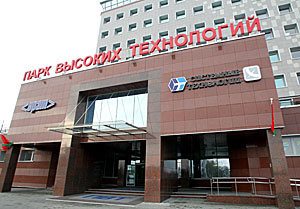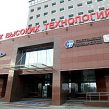
Belarus: Attractive Inside, Not Always Out
Publication: Eurasia Daily Monitor Volume: 11 Issue: 200
By:

No darling of the Western media, Belarus suffers from a peculiar imbalance between two kinds of reporting about it. Much more is written about Belarus’s Soviet legacy and its relationships with external centers of power, Russia and the European Union, than about the actual developments within the country itself. Conditioned by a modest size of Belarus’s economy ($72 billion in 2013), by its overemphasized dependency on subsidies from Russia, and by the West’s unrelenting but not particularly successful democracy promotion, this imbalance reinforces Belarus’s low name recognition and its cliché-ridden image. When some reporters write about Minsk, as the Canadian Lucas Aykroyd recently did, they are regularly torn by competing itches to verbalize this anachronistic image (e.g., “Brezhnev-era city and” “plenty of USSR flavor”) or to describe the more modern scenery of the Belarusian capital, with “cute girls playing with their smartphones and long-haired guys in German heavy-metal T-shirts” (Vancouver Sun, October 30).
Yet, some domestic developments cry out for publicity and go beyond T-shirts. Thus, although Belarus no longer features the brisk pace of economic growth it did prior to 2009—for 2014, just a 2-percent growth is envisaged—some sectors of its economy are thriving. Particularly illustrative is the High-Tech Park (HTP), based in Minsk. In 2013, the combined export from its 128 resident companies amounted to $453 million (88 percent of the HTP’s total output), up from $100 million in 2009. Exports, for the most part, consist of software and other IT products and services. The United States buys $178 million worth of HTP products; Cyprus, $87 million; Russia, $63 million; Germany, $27 million; and the United Kingdom, $26 million. On November 3, President Alyaksandr Lukashenka signed a decree according to which IT, as the major focus of the HTP’s activity, will be supplemented by micro- and nano-electronics, radio-navigation, data processing, and other innovative industries. It is expected that by 2016, exports of HTP-originated products will reach $1 billion (Belorusskie Novosti, November 6).
On November 3, the American InterActiveCorp (IAC) announced that Mindspark Interactive Network, an operating business of IAC, acquired one of the HTP’s resident companies, Apalon (iac.com, November 3). According to the announcement, “Apalon is a Top 10 developer of iOS [Apple’s mobile operating system, which runs on iPads and iPhones] applications worldwide as measured by monthly downloads in September 2014… As a leading provider of mobile applications to the Apple App Store, Google Play and the Amazon Appstore, Apalon reaches 20 million monthly active users. Its applications, many of which rank in the Apple App Store Top 5 in categories such as lifestyle and weather, have been downloaded more than 100 million times in the last year… The Apalon team will continue to be managed by Co-founder and Chief Strategy Officer Peter Skoromnyi and Co-founder and Chief Operating Officer Matvey Timoshenko.” Deliberately or not, the IAC’s press release did not actually identify Apalon as a Belarus-based company. Only Tut.by, Belarus’s private-owned news portal, notes this in its reporting (Tut.by, November 4). This tendency of not disclosing the Belarusian roots of successful businesses and other achievements fits the self-effacing nature of the Belarusian mentality—as described by Yury Shevtsov in his 2005 book, The Phenomenon of Belarus. But it also contributes to Belarus’s low name recognition internationally.
Yet another promising piece of underreported news is that the Chinese-Belarusian Industrial Park (CBIP), located 25 kilometers from Minsk, is nearing the completion of its first phase of construction. At this point, utilities have been linked up to the core area of the park, whose overall size is 8,000 hectares. More than 20 companies expressed interest in becoming residents of the park. Already Huawei and ZTE, the Chinese telecommunications giants, are registered as the CBIP’s residents (Belorusskie Novosti, November 4).
Moreover, during the Belarusian-Lithuanian Economic Forum, held in Mogilev on November 4, it was revealed that cargo from Belarus accounts for 30 percent of all cargo processed by the Klaipeda port. That includes all nitrogen fertilizers and 90 percent of potash exported by Belarus. Whereas, in 2005, 3.5 million tons of Belarus’s cargo was transported through that port, in 2013 almost 10 million tons was. Little wonder then, that Belaruskalii, the Belarusian potash-producing enterprise, is now one of the shareholders of that Baltic Sea port (Belarus Segodnya, November 5).
Reflecting Belarus’s success in maintaining socioeconomic stability, its population has finally resumed growth after declining steadily from 1994 to 2013. On October 1, 2014, it amounted to 9,475,100 people, that is, 6,929 more than on January 1. And this is despite the fact that the excess of deaths over births, though declining, has yet to be overcome. From January to October, it amounted to 1,545 more deaths than births. However, this excess was offset by a positive net migration of 8,474 persons. Those are just migrants that established permanent residency in Belarus. Additionally, the country received plenty of temporary migrants, particularly from Ukraine, some of which may also decide to stay permanently in Belarus (Belta, October 27).
Not everything is serene, of course. For example, a decision was taken, ostensibly by a local police department in Minsk, to expel the human rights activist Elena Tonkacheva from Belarus for a traffic violation (Belorusskie Novosti, November 5). Tonkacheva, a citizen of Russia, spent most of her life in Belarus, and her two children were born there. The poet and 2010 presidential hopeful Vladimir Neklyaev believes that the upcoming eviction of Tonkacheva has to do with the authorities’ preparations for the upcoming 2015 presidential election. Notably, the book, The Square 2010 Through the Eyes of Belarusian Human Rights Activists, which was co-authored by Tonkacheva, became a source of information about the crackdown on the post-election rally on December 19, 2010 (Belorusskie Novosti, November 6). The eviction order, however, is going to be appealed.
Whether or not Tonkacheva’s expulsion will be overturned on appeal, it is more than simply a fly in the ointment. And Belarus can certainly do more to fight its cliché-ridden image besides maintaining stability and boosting innovative industries. Curbing petty vengeance in regard to some non-governmental organizations (NGO) would likely be a step in the right direction.




